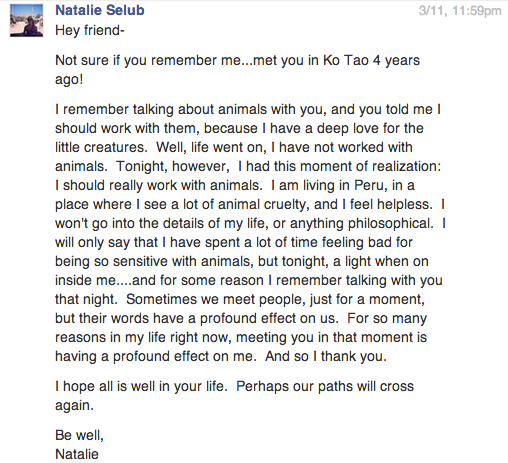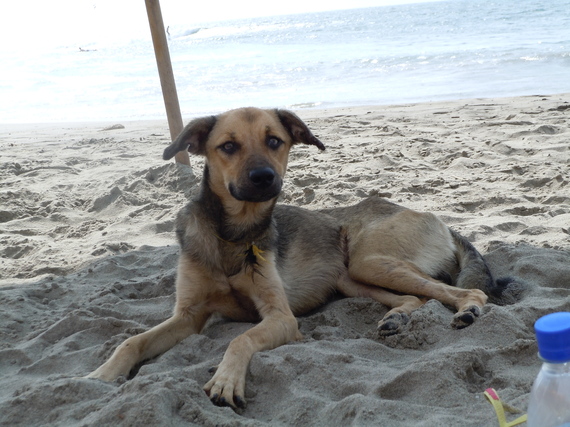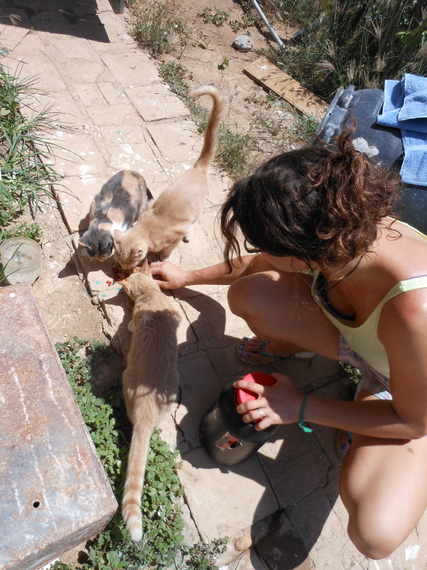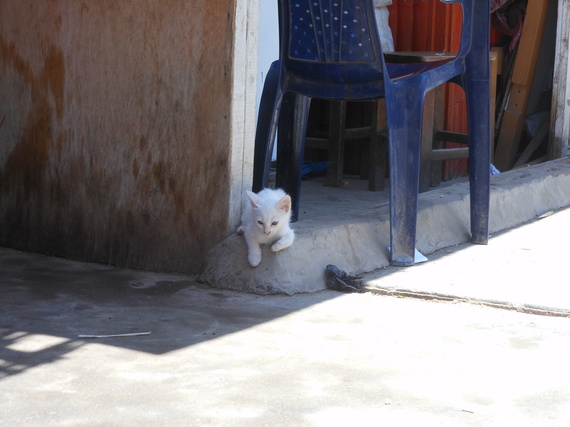I grew up with animals and love them. I speak Spanish and have travelled in the developing world. And my housemate's cat, Jack, is sleeping on my bed right now.
And that is just about the extent that I can personally speak to the issue of animal welfare in Peru. But not Natalie Selub.
For the the last three years, Natalie has been living on and off in Mancora, a little beach town in northern Peru. Mancora is a small fishing town, 20 hours (by bus) from the capital Lima. The nearest city is Piura, four hours away. The annual income in Mancora is low: On average, people make 0.30 a day, or approximately $12.00 a day.
For the animals in Mancora, the situation is abysmal: Hungry dogs roam the street, half limping as they go because they were hit by a moto taxi; emaciated cats, always seemingly pregnant, search for anything to eat. This is the daily scene in the market. The level of squalor that the animals face is inhumane.
For the first time in a few years, Natalie reached out to me.
Natalie's message moved me deeply. Though I had no better idea what can be done for the cats and dogs in Mancora after reading Natalie's message as I had before, I felt an overwhelming sense that Natalie might be able to make a difference as part of a solution. As she suggested to me, maybe she can help create the first local shelter, or identify a veterinarian who would neuter for free.
Natalie's story is below. I asked for her permission to share it here in the hope that if her words resonate with you and you care about the animals, be they in Mancora or Marin County, then you will reach out even if you aren't sure what can be done either. Maybe together, in conjunction with local residents, something can be done. For it is the steps we take together, not the distance we cover or the destination we reach, that make the world better.
As long as I can remember I have had a deep love for animals. Maybe it's not even a 'love' so much as a compassion I feel towards them. I hate to say it, but I often feel more empathy for animals then I do for my fellow man.
I have lived the last 30 years 'feeling bad' for animals that seem sad, and trying in my small little way to help them. Little things like feeding a stray and helping it find its owner (because in the USA cats and dogs that roam the streets have owners, and if they don't they are hidden in animals shelters that, unless you dare go into, you never know exist). I don't know what it is about the little creatures, but I feel them in my soul. Seeing a sad or abused animal can weigh on me and cause me to obsess for an unhealthy amount of time.
Well, the last three years I have been living (on and off) in a little beach town in northern Peru called Mancora. For anyone who has left the first world, you know that animals in the "non first world" are not always treated with the same standard as they are in the developed world. Let me tell you, I have tried to accept this. This is my fourth time in Mancora, and I am yet to adjust. But what HAS happened, sadly, is I have began to look away. I know that giving my attention to an injured dog will end in tears and frustration, so I just don't look. I squelch my desire to help, to feel for them, and I just keep walking.
Well, this is half true. The other side is this: a little kitten managed to wander into my backyard upon my arrival here four months ago. Awww, a sweet, scared little gatito that just needed a little food and love. That wasn't too much to ask right? 'No,' my boyfriend warned me, 'please do not feed this cat, because feeding one cat brings 10.' Thinking that he was just insensitive, I began secretly feeding the kitten, just a little in the night. Oh, and then his litter mate appeared. 'Well, I don't want to be obligated to two, but they ARE siblings, so just until they get a little bigger,' I convinced myself. You can imagine where this story is going. Another cat came. This one aggressive, hungry and persistent. Now, every day I walk into my backyard and there is a symphony and cats crying at my feet. And while I do feel annoyed, I feel it's my obligation to help them.
What I am seeing now, however, is that by feeding these cats I am doing them a disservice. What happens to them when I leave in a few months? No one, and I am no one here is going to feed these cats. You know what people here do when an unwanted cat or dog comes along? They poison them, or throw rocks at them. Even the one veterinarian here doesn't seem too interested in really helping the animals out.
I know I know, people here have concerns beyond matching their dog's collar to his leash and buying biodegradable poop bags (I have also been living in Santa Barbara California for the last 10 years, so the the whole 'hierarchy of needs' thing here is a wake up call). I am beginning to think that here in Peru it's kind of like the 'raw, uncut' version of life. Back home there is garbage, but it's not on the streets because the trash man comes and takes it far far away so we never have to think about it. And there are sick, skinny dogs in California too, but they are in a building where people are paid to take care of them until they find a home, or put them down. As Gandhi put it, 'The greatness of a nation can be measured by the way its animals are treated.' Do we really treat our animals better in the developed world? I don't know, but the animal life here looks like hell, and I don't know what to do to really help.
But I must do something...
Signed,
Frustrated
If you have any experience with stray cats and dogs in developing countries or just love your cat or dog deeply, I hope you will leave your feedback in the comments or reach out to Natalie directly.






